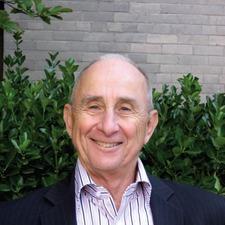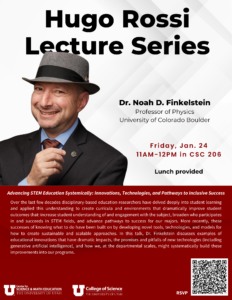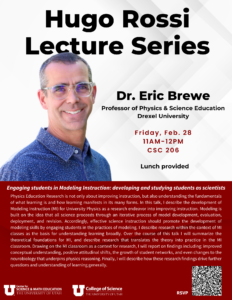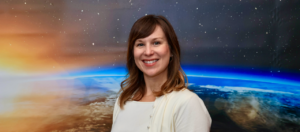 The Center for Science and Mathematics Education administers the Hugo Rossi Lecture Series which was named in honor of the CSME’s founding director. The lecture series is designed to bridge the College of Science and College of Education by attracting speakers whose scholarly pursuits include K-16 math/science education research.
The Center for Science and Mathematics Education administers the Hugo Rossi Lecture Series which was named in honor of the CSME’s founding director. The lecture series is designed to bridge the College of Science and College of Education by attracting speakers whose scholarly pursuits include K-16 math/science education research.
The Hugo Rossi Lecture Series typically brings 4-6 speakers to campus each year. The College of Education, the School of Biological Sciences, and the departments of Chemistry, Mathematics, and Physics & Astronomy are invited to nominate and host speakers. For information about the nomination process, please contact outreach@csme.utah.edu.
Contact outreach@csme.utah.edu for more information about these events.
Upcoming Hugo Rossi Presentations
Stay tuned for our Hugo Rossi Lecture Series lineup for the 2025-2026 school year!
Email kendall.vanhorssen@utah.edu to join our mailing list to be the first to know about our next speakers.
Thank you to our guests, Dr. Noah Finkelstein and Dr. Eric Brewe, for joining us this year. We appreciate everyone that joined us for our lecture series!
Previous Hugo Rossi Presentations
-
Dr. Noah Finkelstein, University of Colorado Boulder
Topic: Advancing Education Systemically: Innovations, Technologies, and Pathways to Inclusive Success
Over the last few decades disciplinary-based education researchers have delved deeply into student learning and applied this understanding to create curricula and environments that dramatically improve student outcomes that: increase student understanding of and engagement with the subject, broaden who participates in and succeeds in STEM fields, and advance pathways to success for our majors. More recently, we have built on these successes of knowing what to do by developing novel tools, technologies, and models for how we might create sustainable and scalable approaches. In this talk, I discuss examples of educational innovations that have dramatic impacts, the promises and pitfalls of new technologies (including generative artificial intelligence), and how we, at the departmental scales, might systematically build these improvements into our programs.
EVENT DETAILS:
Friday, January 24, 2025
Crocker Science Center (CSC), Room 206
1390 Presidents Cir.
University of Utah campus
Lecture: 11:00 am - 12:00 pm
Learn more about Dr. Noah Finkelstein: https://www.colorado.edu/physics/noah-finkelstein

Dr. Eric Brewe, Drexel University
Topic: Engaging students in Modeling Instruction: developing and studying students as scientists
Physics Education Research is not only about improving instruction but also understanding the fundamentals of what learning is and how learning manifests in its many forms. In this talk I describe the development of Modeling Instruction (MI) for University Physics as a research endeavor into improving instruction. Modeling is built on the idea that all science proceeds through an iterative process of model development, evaluation, deployment, and revision. Accordingly, effective science instruction should promote the development of modeling skills by engaging students in the practices of modeling. I describe research within the context of MI classes as the basis for understanding learning broadly. Over the course of this talk I will summarize the theoretical foundations for MI, and describe research that translates the theory into practice in the MI classroom. Drawing on the MI classroom as a context for research, I will report on findings including improved conceptual understanding, positive attitudinal shifts, the growth of student networks, and even changes to the neurobiology that underpins physics reasoning. Finally, I will describe how these research findings drive further questions and understanding of learning generally.
EVENT DETAILS:
Friday, February 28, 2025
Time: 11:00am - 12:00pm
Crocker Science Center (CSC), Room 206
1390 Presidents Cir.
University of Utah campus
Learn more about Dr. Eric Brewe: https://ericbrewe.com/

-

Climate Change and Teaching Activism
Learning how to engage with climate change in both our professional and personal lives can at times be daunting, but also incredibly rewarding and empowering. In this talk, I will share my personal experiences navigating climate change teaching and activism in both West Virginia and Alabama, two states that rely heavily on coal. I will share what it was like to work with students to host a climate rally on campus in coordination with the global climate strikes in 2019 and lead a “WVU Climate Education Day” at the WV State Capitol in February 2020. I will share what it was like to design the West Virginia Climate Change Professional Development (WVCCPD) Project, which engages K-12 teachers in climate change learning through: (1) climate change physical science, such as the greenhouse effect and the carbon cycle, and understanding the evidence for climate change, (2) climate change social science, including how to identify misinformation, understand our carbon footprints, and understand our community, and (3) climate change solutions and action, such as Project Drawdown, En-Roads, and the power of youth voice and communication techniques. WVCCPD has engaged over 120 teachers and hosts an annual climate change Public Service Announcement (PSA) competition for students to design video and audio clips, which then air on news and TV stations around the state, reaching an estimated 40,000 residents. I will talk about how we have funded this work, and how my conceptions of how I engage with my community have changed over time. I will share some of my personal actions, such as through volunteering with my local activist groups, creating climate change art, navigating climate change emotions and finding hope. I will close with recommendations for books, podcasts, leaders, and groups from whom I continue to learn.
Tuesday, December 5, 2023
Crocker Science Center (CSC), Room 206
Reception: 3:30pm
Lecture: 4pm-5pm
Learn more about Dr. Kathryn Williamson: https://www.kwilliamsonconsulting.com/
Noah Weeth Feinstein, Professor of Curriculum & Instruction and Community & Environmental Sociology
University of Wisconsin-Madison
Three ideas that are (probably) more useful than science literacy
Competent outsiders, epistemic networks, and appropriate respect
The phrase “science literacy” has carried the hopes and ambitions of our field for the better part of a century - but it may be time to move on. What other ideas can help us understand the value of science education for society? What assumptions must we challenge in response to intersecting threats to democracy, to peace and justice, and to the climate and ecological stability on which our cultures are built? In this talk, I introduce three concepts - one old and two new - and discuss how each of them offers a different way of thinking about what science education can do for students and society.
https://ci.education.wisc.edu/fac-staff/feinstein-noah/
Friday, November 10, 2023
Crocker Science Center (CSC), Room 206
Lecture: 3:00pm - 4:00pm
Reception: 4:00pm - 5:00pm
-
- March 15, 2023: Dr. Clifton Sanders, Provost for Academic Affairs at Salt Lake Community College, presented "Becoming and Belonging: A STEM Journey".
- January 13, 2023: Dr. Charles Henderson (Western Michigan University) and Dr. Melissa Dancy (Western Michigan University) presented “How Well-meaning People of Privilege Maintain Inequality in Physics and STEM”.
-
- February 4, 2022, 1-2:15pm: Maisie Gholson, University of Michigan (this virtual event is co-hosted by the College of Education)
- March 18, 2022,2-3:15pm : Shirin Vossoughi, Northwestern University (this virtual event is co-hosted by the College of Education)
- April 25, 2022, 2-3:15pm: Kelly MacArthur, Montana State University (this event is in-person and co-hosted by the Department of Mathematics)
-
- Carrie Tzou, University of Washington – “Designing family-centered science and engineering education for culturally thriving communities” (hosted by the College of Education)
- Simone Hyater-Adams, American Physical Society – “Becoming an agent of change in physics” (hosted by the Department of Physics & Astronomy)
-
- Renee Cole, University of Iowa – “Enhancing learning by promoting and assessing more than content knowledge” (hosted by Department of Chemistry)
- Kara Jackson, University of Washington – “Improving mathematics teaching at scale: Centering equity-specific learning demands” (hosted by the College of Education)
- Erin Dolan, University of Georgia – “Undergraduate Research at Scale: What if the treatment is a CURE?” (hosted by School of Biological Sciences)
- Kelly Mack, Association of American Colleges and Universities – “That None Shall Perish” (co-hosted by CSME’s HHMI UPSTEM project)
- Erika Bullock, University of Wisconsin-Madison – “Equity in Mathematics Education as an Exercise in Benevolence” (hosted by the College of Education)
- CANCELLED: Charles Henderson, Western Michigan University – “Physics education research in higher education: What can we learn from the top-cited papers in the Physical Review?” (hosted by Department of Physics & Astronomy)
- Chris Rasmussen, San Diego State University – “Insights from Two National Studies of Precalculus through Calculus 2” (hosted by the Department of Mathematics – virtual lecture)
-
- Nathan Klingbeil, Wright State University – “Uncorking Curricular Bottlenecks to Student Success in STEM” (February 27, 2019, co-hosted by HHMI UPSTEM)
-
- Gina Frey, Washington University in St. Louis – “Concept-Building Approaches: How do Students’ Approaches Affect their Performances in Chemistry Courses?” (September 25, 2017, hosted by the Department of Chemistry)
- Chandra Turpen, University of Maryland – “Supporting students in building interdisciplinary connections across physics and biology” (October 5, 2017, hosted by the Department of Physics & Astronomy)
- Natasha Speer, University of Maine – “Why did they think that? The use and development of mathematical knowledge for teaching at the undergraduate level” (November 30, 2017, hosted by the Department of Mathematics)
- Rochelle Gutierrez, University of Illinois – “Rehumanizing Mathematics: Should That Be Our Goal?” (January 18, 2018, hosted by the College of Education)
- David Asai, Howard Hughes Medical Institute – “Inclusive Excellence in STEM” (March 15, 2018)
- Kimberly D. Tanner, San Francisco State University – “Collectively Improving Our Teaching: Department-wide Efforts in Scientific Teaching that Produced Classroom Transformations, Unanticipated Discoveries, and Scholarly Publications” (April 12, 2018 – hosted by the Department of Biology)
-
- Ilana Horn, Vanderbilt University – “An Asset Orientation is Everything: How Strengths-Based Approaches to Math Teaching Help Teachers and Students” (March 29, 2017 – hosted by College of Education)
- Jenny Knight, University of Colorado, Boulder – “Improving student learning through understanding reasoning and problem solving practices” (February 23, 2017 – hosted by Department of Biology)
- Cynthia Passmore, University of California, Davis – “Learning about versus figuring out: Engaging students in the practice of modeling in the science classroom” (February 2, 2017 – hosted by College of Education)
- Diane Bunce, The Catholic University of America – “How do we use research on teaching and learning to influence our teaching?” (October 4, 2016 – hosted by Department of Chemistry)
-
- David Laude, University of Texas – Austin – “Creating a Campus Culture Where Every Student Graduates” (April 15, 2016)
- Mary Wenderoth, University of Washington – “End of Lecture: The Future of Evidence-Based Teaching” (April 8, 2016)
- Carol Gross, University of California San Francisco – “Participation of Women in Science: Problems and Solutions” (March 23, 2016)
- Charles Coble, Science and Mathematics Teaching Imperative (SMTI) and The Third Mile Group and Teacher Preparation Analytics – “Ten Key Questions University Leaders Should Ask About Quality Science and Mathematics Teacher Preparation” (March 7, 2016)
- Jill Marshall, University of Texas – Austin – “The UTeach Model of STEM Teacher Preparation: Replication and Opportunities for Growth” (February 17, 2016)
- Susan Shadle, Boise State University – “Stimulating Change in STEM Education: Engaging Faculty at the Department Level” (January 27, 2016)
- Michael Schatz, Georgia Institute of Technology – “Fully Online Introductory Physics with a Bona Fide Lab” (January 20, 2016)
- David Feldon, Utah State University – “Standing on the Shoulders of Giants: Using the Lessons of Science to Prepare and Retain Skilled Teachers of Science” (December 2, 2015)
- Ken Heller, University of Minnesota – “Why Doesn’t It Work Here? A systems approach to physics instruction” (October 7, 2015)
- Scott Baldridge, Louisiana State University – “A Story of Mathematics Curriculum: Eureka Math” (August 26, 2015)
-
- Michael W. Klymkowsky, University of Colorado Boulder – “Challenges in Implementing, Designing and Delivering Coherent Curricula in STEM (and particularly Biology)” (April 15, 2015)
- Eric Mazur, Harvard University – “Confessions of a converted lecturer” (March 2, 2015)
- Melanie M Cooper, Michigan State University – “Evidence-Based Approaches to STEM Curriculum Reform” (February 9, 2015)
- Jeffrey S. Moore, University of Illinois at Urbana-Champaign – “College Coaching for 21st Century Minds” (January 27, 2015)
- Deborah Loewenberg Ball, University of Michigan – “Why is Skillful Mathematics Teaching So Important and (How) Could the U.S. Supply it at Scale?” (November 3, 2014)
- Janice Bradley, New Mexico State University – “It’s All of Us: Creating Effective Learning Environments for Diverse Learners” (October 1, 2014)
-
- David Temme, University of Utah – “How can the brain (a biological organ) best be schooled by school?” (February 5, 2014)
- Jan-Willem van Holten, Leiden University – “HiSPARC: an experiment in science and education” (January 10, 2014)
- Steven Case, Kansas University – “The Path to STEM Literacy: traveling a hard road” (December 3, 2013)
- Charles Atwood, University of Utah – “Improving Success Rates in Large General Chemistry Classes” (November 12, 2013)
- Brett Moulding – “Understanding the National Research Council’s Framework for K-12 Science Education and Next Generation Science Standards” (November 4, 2013)
-
- Fred Swanson, Oregon State University – “From the Physical to the Philosophical: Science-Arts-Humanities Collaborations at Sites of Long-Term Ecological Inquiry” (April 17, 2013)
- Janine Remillard, University of Pennsylvania – “Making Mathematics Locally Relevant for Teachers and Students” (March 1, 2013)
- David Chard, Southern Methodist University – “Transforming Public Education: Balancing Innovation with Evidence” (January 28, 2013)
- Herb Clemens, Ohio State University – “Mathematics Teachers as Professionals” (September 19, 2012)
- Saundra Y. McGuire, Louisiana State University – “Strategies for Effective Mentoring of 21st Century STEM Students” (March 19, 2012)
